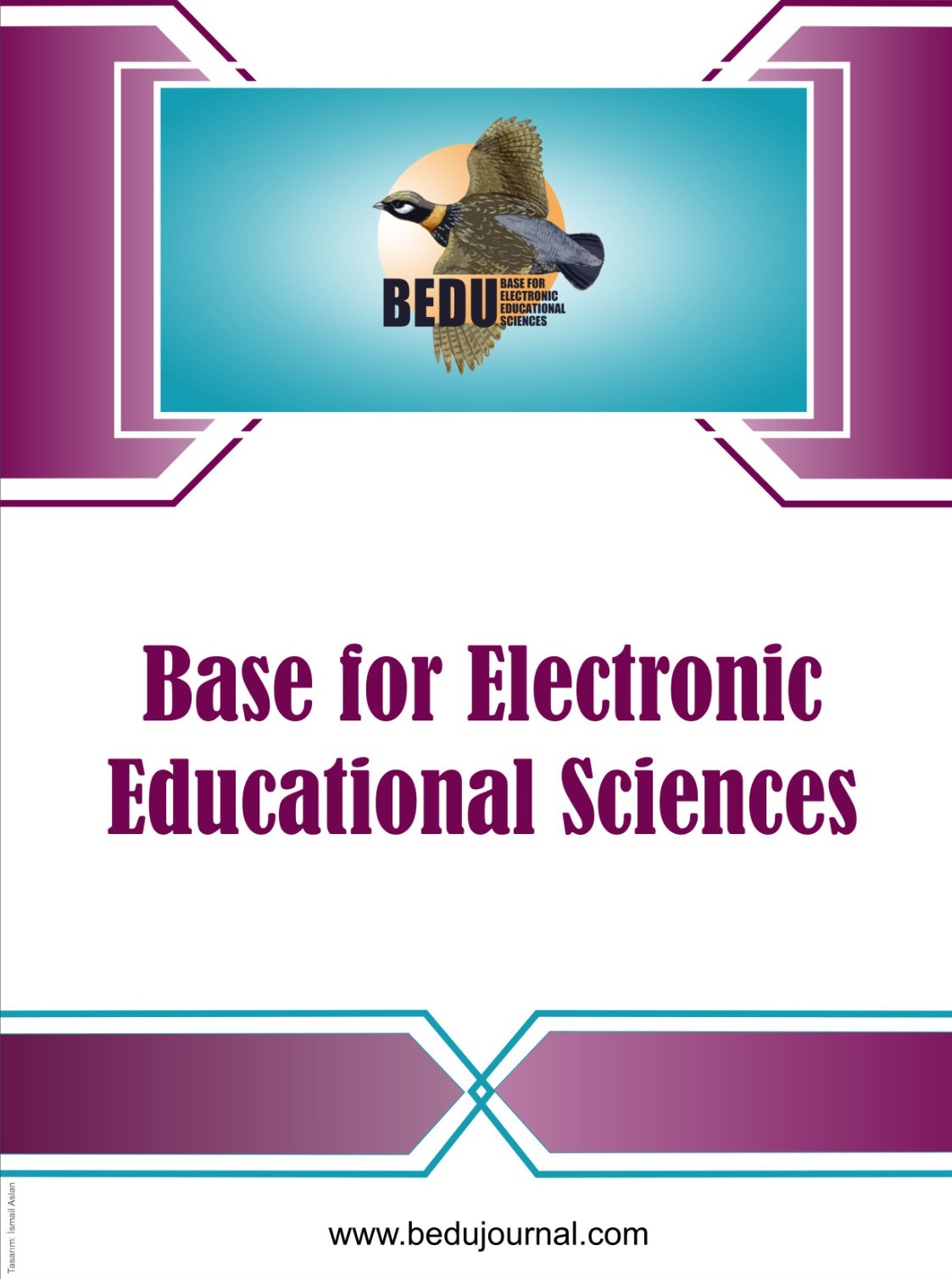Research article | Open Access
Base for Electronic Educational Sciences 2021, Vol. 2(1) 1-20
An Analysis of Primary School 4th-Grade Students' Local Literacy Levels (The Case of Canakkale Province)
pp. 1 - 20 | DOI: https://doi.org/10.29329/bedu.2021.343.1
Publish Date: March 31, 2021 | Single/Total View: 128/953 | Single/Total Download: 185/2.129
Abstract
This study aimed to examine the 4th-grade students in terms of 'local literacy', which has been presented as a new literacy type in the relevant literature. In the study which was conducted as a descriptive and qualitative study, the data was gathered through a structured interview form including open-ended questions which were prepared to measure the local literacy skills of the 4th-grade students who were studying in the city center of Çanakkale province. The collected data were examined with the techniques suitable for the qualitative research method, and according to the findings, it was concluded that the participant 4th-grade students did not have sufficient literacy skills to introduce the historical and cultural values of the sites where they reside. Based on these results, relevant suggestions have been presented with this study to help students gain local literacy skills with the help of FOKUSD applications.
Keywords: Local Literacy, Social Studies, Primary School
APA 7th edition
Akbas, Y., & Guven, B. (2021). An Analysis of Primary School 4th-Grade Students’ Local Literacy Levels (The Case of Canakkale Province). Base for Electronic Educational Sciences, 2(1), 1-20. https://doi.org/10.29329/bedu.2021.343.1
Harvard
Akbas, Y. and Guven, B. (2021). An Analysis of Primary School 4th-Grade Students’ Local Literacy Levels (The Case of Canakkale Province). Base for Electronic Educational Sciences, 2(1), pp. 1-20.
Chicago 16th edition
Akbas, Yasir and Bulent Guven (2021). "An Analysis of Primary School 4th-Grade Students’ Local Literacy Levels (The Case of Canakkale Province)". Base for Electronic Educational Sciences 2 (1):1-20. https://doi.org/10.29329/bedu.2021.343.1
Açık, İ. (2020). İlkokul sosyal bilgiler dersinde kültürel mirasa duyarlılık ve vatanseverlik değerlerinin biyografilerle öğretimi. Unpublished Master Thesis, Bülent Ecevit Üniversitesi Sosyal Bilimler Enstitüsü, Zonguldak.
Altun, A. and Gürer, M. D. (2005). Tekli okuryazarlıktan çoklu okuryazarlığa doğru: Medya okuryazarlığı. A. Altun ve S. Olkun (Ed.) Güncel gelişmeler ışığında: Matematik fen teknoloji yönetim (s. 177-190). Ankara: Anı Yayıncılık.
Aşıcı, M. (2009). Kişisel ve sosyal bir değer olarak okuryazarlık. Değerler Eğitimi Dergisi, 17, 9-26.
Ata, B. and Keçe, M. (2014). Öğrencilerin tarih okuryazarlığı düzeylerini etkileyen faktörler: öğretmen görüşlerine dayalı nitel bir araştırma. Türk Tarih Eğitim Dergisi, 3(2), 1-23.
Çankırılı, A. (2015); Ailede ve okulda değerler eğitimi. İstanbul: Zafer Yayınları.
Ergen, G. (2006). Eleştirel-bilinçli sevgi eğitimi. Süleyman Demirel Üniversitesi Burdur Eğitim Fakültesi Dergisi, 8(12), 144-152.
Gençtürk, E. and Karatekin, K. (2013). Sosyal bilgiler için çoklu okuryazarlıklar. Ankara: Pegem Yayıncılık.
Güneş, F. (1994). Okuryazarlık kavramı ve düzeyleri. Ankara Üniversitesi Eğitim Bilimleri Fakültesi Dergisi, 27(2).
Güven, B. (2018). Sosyal bilgiler öğretiminde alternatif bir yaklaşım: Yerel okuryazarlık. 27. Uluslararası Eğitim Bilimleri Kongresi, 549-1554, Doi: 10.14527/9786052414743.
Güven, B. (2019). Yerel okuryazarlık (1. Ed.). Ankara: Pegem Akademi Yayıncılık.
Güven, B. (2021). An alternative source of development for local governments: local literacy. International Journal of Education & Literacy Studies, 9(1), 105-112.
Halaç, H. H., Akdağ, H. & Bekki. A. (2018). Mardin merkez ve kızıltepe’de ortaokul öğrencilerinin tarihi ve kültürel mirasın tanınmasına ve korunmasına yönelik farkındalıklarının ölçülmesi. The Journal of International Lingual, Social and Educational Sciences, 4(1), 50-64.
Lankshear, C. (1999). Literacy studies in education: Disciplined developments in a post-disciplinary age. Peter M (Ed.), After the disciplines: The emergence of cultural studies. Connecticut: Greenwood.
Merry, M. (2009). Patriotism, history and the legitimate aims of American education. Educational Philosophy and Theory, 41(4), 378– 398.
Öztürk, C. and Deveci, H. (2011). Farklı ülkelerin sosyal bilgiler öğretim programlarının değerlendirilmesi. (Ed. C. Öztürk), In Farklı ülkelerin sosyal bilgiler öğretim programları (p. 1-41). Ankara: Pegem Akademi.
Rapoport, A. (2009). Lonely business or mutual concern: The role of comparative education in the cosmopolitan citizenship debates. Current Issues in Comparative Education, 12(1), 23-32.
Safran, M. and Ata, B. (1998). Okul dışı tarih öğretimi. Gazi Eğitim Fakültesi Dergisi, 1(1), 87-94.
Şarşembiyeva, T. (2015). Kırgızistan’da vatanseverlik algısı üzerine bir araştırma. Atatürk Üniversitesi Sosyal Bilimler Enstitüsü Dergisi, 19(2), 175-185.
Türk Dil Kurumu (2017a). Retrieved from http://www.tdk.gov.tr/index.php?option=com_gts&arama=gts&guid=TDK.GTS.58f3d37d7ba603.87077702 on 02 February 2018
Türk Dil Kurumu (2017b). Retrieved from http://www.tdk.gov.tr/index.php?option=com_gts&arama=gts&guid=TDK.GTS.58f3da62b8c179.81740809 on 02 February 2018
Yıldırım, A. and Şimşek, H. (2006). Sosyal bilimlerde nitel araştırma yöntemleri. Ankara: Seçkin Yayıncılık.
